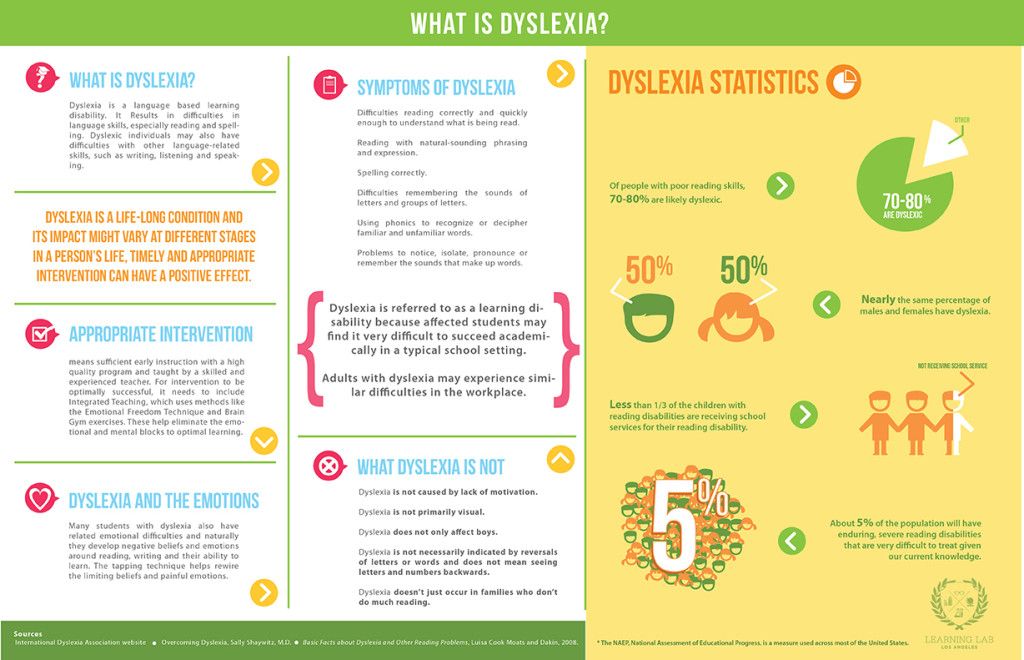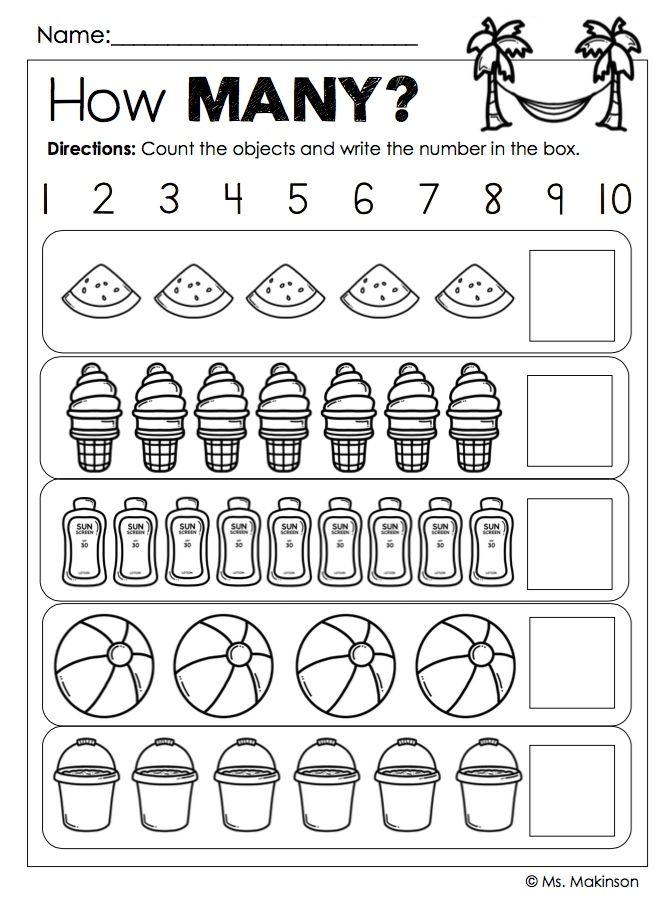How to test if my child is dyslexic
Reading Disability Symptoms in Children
Dyslexia Symptom Test for Children
Dyslexia is a learning disability that makes it hard for children to read, spell, and plan effectively. Dyslexia occurs in the brain, and it's highly genetic; if you have dyslexia, chances are much greater that your child will have dyslexia, too.
If dyslexia goes undiagnosed, a child can not only fall behind in reading but also in development of advanced language and vocabulary skills. That, in turn, can cause her to think of herself as "stupid" or "slow" — which means it's important to pursue a diagnosis as soon as you see warning signs.
A person can be evaluated for dyslexia by a knowledgeable psychologist, diagnostic specialist or learning disability specialist. These specialists use a variety of test instruments including the Lindamood Test (for sound and phonetics), the Woodcock Johnson Achievement Battery, and the Grey Oral Reading Test, among others.
Once the condition is properly diagnosed, you can set up helpful school accommodations such as phonics training that put language skills back on track and thus rebuild self-esteem.
This free dyslexia self-test is designed to determine whether your child shows symptoms similar to those of dyslexia. If the results give you further concern about the possibility of dyslexia, see an educational professional. An accurate diagnosis can only be made through clinical evaluation. This self-test is for personal use only.
This free dyslexia symptom test was created from criteria developed by the National Dissemination Center for Children with Disabilities.
Does your child struggle with word problems — even though he’s otherwise good at math?
Very Often
Often
Sometimes
Rarely
Never
Does your child have difficulty sustaining attention? Does she space out or get labeled a “daydreamer?”
Very Often
Often
Sometimes
Rarely
Never
Does your child avoid reading altogether, or does she get easily frustrated when completing reading-related assignments?
Very Often
Often
Sometimes
Rarely
Never
Does your child confuse his left from his right?
Very Often
Often
Sometimes
Rarely
Never
Does your child have difficulty budgeting her time or following a schedule?
Very Often
Often
Sometimes
Rarely
Never
Is your child of average or above-average intelligence, but seems unable to read at her grade level?
Very Often
Often
Sometimes
Rarely
Never
Does your child spell inconsistently, misspelling words she already knows?
Very Often
Often
Sometimes
Rarely
Never
Does your child ever say that words “wiggle” or “shimmer” on the page while he’s reading?
Very Often
Often
Sometimes
Rarely
Never
Does your child spell inconsistently, misspelling words she already knows?
Very Often
Often
Sometimes
Rarely
Never
Does your child complain of headaches, stomachaches, or dizziness when reading?
Very Often
Often
Sometimes
Rarely
Never
After reading a passage, is your child unable to give a summary or discuss key points with you?
Very Often
Often
Sometimes
Rarely
Never
Is your child’s handwriting inconsistent? Is it less legible some days than others?
Very Often
Often
Sometimes
Rarely
Never
Does your child struggle to copy letters, numbers, or symbols?
Very Often
Often
Sometimes
Rarely
Never
Does your child struggle to sound out unknown words?
Very Often
Often
Sometimes
Rarely
Never
Does it seem like your child is better at expressing himself verbally than he is at writing?
Very Often
Often
Sometimes
Rarely
Never
When reading out loud, does your child repeat words, mix up letters, or change word order without noticing?
Very Often
Often
Sometimes
Rarely
Never
(Optional) Would you like to receive your dyslexia symptom test results — plus more helpful resources — via email from ADDitude?
Subscribe me to your newsletter!
Can’t see the self-test questions above? Click here to open this test in a new window.
Test for Dyslexia in Children: Next Steps
1. Learn: Dyslexia Symptom Overview for Children
2. Download: 18 Writing Tricks for ADHD Students
3. Take This Test: Could My Child Have a Learning Disability?
4. Take This Test: Executive Function Deficits in Children
5. Take This Test: Dyscalculia Symptoms in Children
Previous Article Next Article
Dyslexia - Diagnosis and treatment
Diagnosis
There's no single test that can diagnose dyslexia. A number of factors are considered, such as:
- Your child's development, educational issues and medical history. The health care provider will likely ask you questions about these areas. Also, the provider will want to know about any conditions that run in the family, including dyslexia or any other type of learning disability.

- Questionnaires. The provider may have your child, caregivers or teachers complete questionnaires. Your child may be asked to take tests to identify reading and language abilities.
- Vision, hearing and brain (neurological) tests. These can help determine whether another disorder may be causing or adding to your child's difficulty reading.
- Psychological evaluation. The provider may ask you and your child questions to better understand your child's mental health. This can help determine whether social problems, anxiety or depression may be limiting your child's abilities.
- Tests for reading and other academic skills. Your child may take a set of educational tests and have the process and quality of reading skills analyzed by a reading expert.
Treatment
There's no known way to correct the underlying brain differences that cause dyslexia. However, early detection and evaluation to determine specific needs and appropriate treatment can improve success. In many cases, treatment can help children become competent readers.
In many cases, treatment can help children become competent readers.
Educational techniques
Dyslexia is treated using specific educational approaches and techniques, and the sooner the intervention begins, the better. Evaluations of your child's reading skills, other academic skills and mental health will help your child's teachers develop an individual teaching program.
Teachers may use techniques involving hearing, vision and touch to improve reading skills. Helping a child use several senses to learn — for example, listening to a taped lesson and tracing with a finger the shape of the letters used and the words spoken — can help in processing the information.
Treatment focuses on helping your child:
- Learn to recognize and use the smallest sounds that make up words (phonemes)
- Understand that letters and strings of letters represent these sounds and words (phonics)
- Understand what is read (comprehension)
- Read aloud to build reading accuracy, speed and expression (fluency)
- Build a vocabulary of recognized and understood words
If available, tutoring sessions with a reading specialist can be helpful for many children with dyslexia. If your child has a severe reading disability, tutoring may need to occur more frequently, and progress may be slower.
If your child has a severe reading disability, tutoring may need to occur more frequently, and progress may be slower.
Individual education plan
In the United States, schools have a legal obligation to take steps to help children diagnosed with dyslexia with their learning problems. Talk to your child's teacher about setting up a meeting to create a structured, written plan that outlines your child's needs and how the school will help your child succeed. This is called an Individualized Education Plan (IEP).
Early treatment
Children with dyslexia who get extra help in kindergarten or first grade often improve their reading skills enough to succeed in grade school and high school.
Children who don't get help until later grades may have more difficulty learning the skills needed to read well. They're likely to lag behind academically and may never be able to catch up. A child with severe dyslexia may never have an easy time reading. But a child can learn skills that improve reading and develop strategies to improve school performance and quality of life.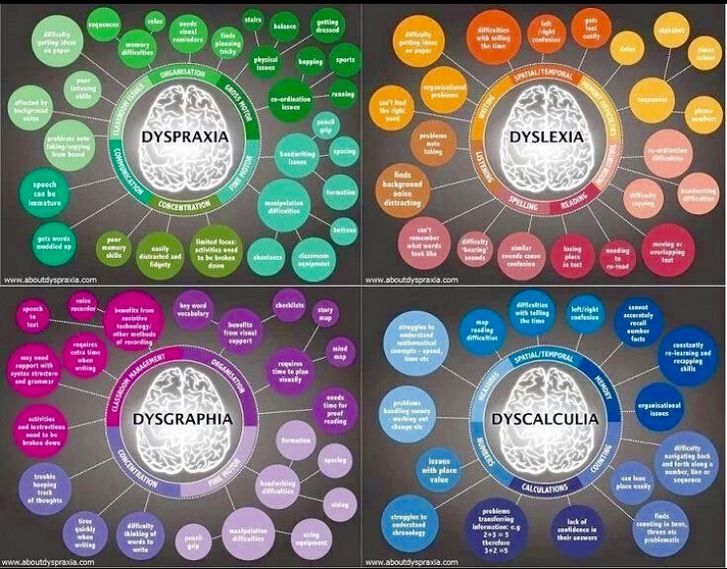
What parents can do
You play a key role in helping your child succeed. You can take these steps:
- Address the problem early. If you suspect that your child has dyslexia, talk to your child's health care provider. Early intervention can improve success.
- Read aloud with your child. It's best if you start when your child is young, but it's never too late to start. Introducing books as a toy to babies encourages fun, learning and social interaction with caregivers. Read stories to your child. Also, try listening to recorded books with your child. When your child is old enough, read the stories together after your child hears them.
- Work with your child's school. Talk to the teacher about how the school will help your child succeed. You are your child's best advocate.
- Encourage reading time. Set aside time each day to read with your child. To improve reading skills, a child must practice reading.
 Encourage your child to read as skills develop. Also have your child read aloud to you.
Encourage your child to read as skills develop. Also have your child read aloud to you. - Set an example for reading. Designate a time each day to read something of your own while your child reads — this sets an example and supports your child. Show your child that reading can be enjoyable.
What adults with dyslexia can do
Success in employment can be difficult for adults who have dyslexia. To help achieve your goals:
- Seek evaluation and instructional help with reading and writing, regardless of your age
- Ask about additional training and reasonable accommodations from your employer or academic institution under the Americans with Disabilities Act
Academic problems don't necessarily mean a person with dyslexia can't succeed. Capable students with dyslexia can be highly successful given the right resources. Many people with dyslexia are creative and bright and may be gifted in math, science or the arts. Some even have successful writing careers.
Some even have successful writing careers.
Request an Appointment at Mayo Clinic
Coping and support
Emotional support and opportunities for achievement in activities that don't involve reading are important for children with dyslexia. If your child has dyslexia:
- Be supportive. Trouble learning to read may affect your child's self-esteem. Be sure to express your love and support. Offer encouragement by praising your child's talents and strengths. Talk to the school staff so they can provide the services and support that your child needs to succeed.
- Talk to your child. Explain to your child what dyslexia is and that it's not a personal failure. Understanding this can help your child better cope with having a learning disability.
- Take steps to help your child learn at home. Provide a clean, quiet, organized place for your child to study, and designate a study time. Also, make sure your child gets enough rest and eats regular, healthy meals.
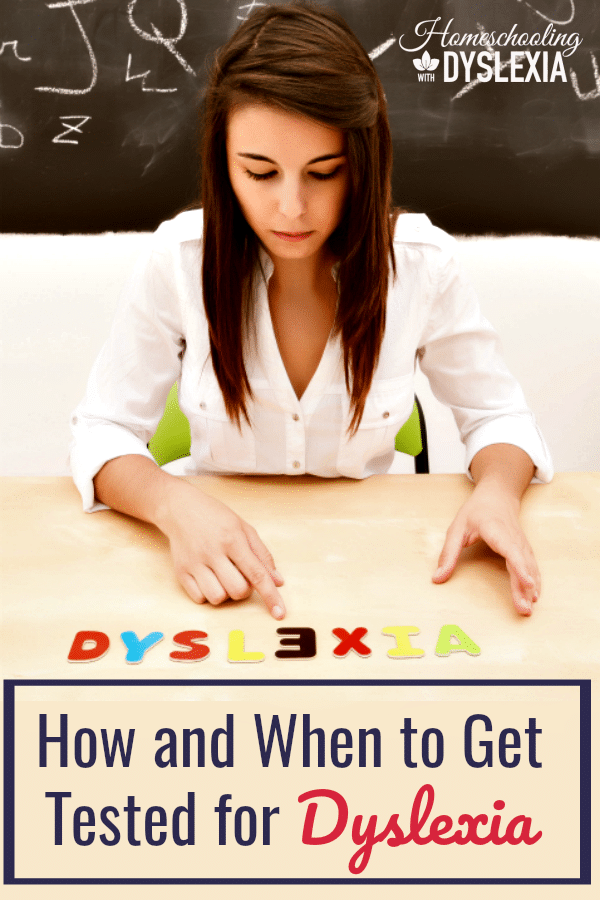
- Limit screen time. Limit electronic screen time each day and use the extra time for reading practice.
- Stay in contact with your child's teachers. Talk with teachers frequently to make sure your child can stay on track. If needed, be sure your child gets extra time for tests that require reading. Ask the teacher if it would help your child to record the day's lessons to play back later.
- Join a support group. This can help you stay in contact with parents whose children face similar learning disabilities. Support groups can provide useful information and emotional support. Ask your health care provider or your child's reading specialist if there are any support groups in your area.
Preparing for your appointment
You may first bring up your concerns with your child's pediatrician or family health care provider. To ensure that another problem isn't at the root of your child's reading difficulties, the provider may refer your child to a:
- Specialist, such as an eye doctor (ophthalmologist or optometrist)
- Health care professional trained to evaluate hearing (audiologist)
- Specialist in brain and nervous system disorders (neurologist)
- Specialist in the central nervous system and behavior (neuropsychologist)
- Specialist in children's development and behavior (developmental and behavioral pediatrician)
You may want to ask a family member or friend to come along, if possible, for support and to help you remember information.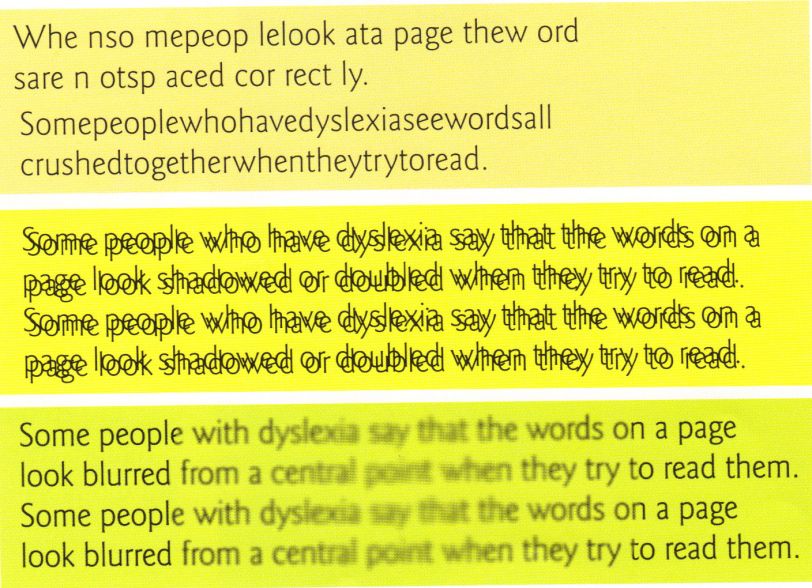
Bringing school records is especially helpful for the evaluation done by health care providers. These records can include your child's IEP or 504 Plan, report cards, written communications from school noting concerns, and a limited number of your child's work samples.
Here's some information to help you prepare for your appointment:
What you can do
Before your appointment, make a list of:
- Any symptoms your child is experiencing and the ages when symptoms were first noticed, including any symptoms that may seem unrelated to the reason for the appointment
- Key personal information, including any major stresses or recent life changes
- Any medications, vitamins, herbs or other supplements that your child is taking, including the dosages
- Questions to ask the health care provider to help you make the most of your appointment
Questions to ask may include:
- What do you think is the cause of my child's difficulty with reading?
- Are there other diagnoses that can be associated with or confused with dyslexia?
- What kinds of tests does my child need?
- Should my child see a specialist?
- How is dyslexia treated?
- How quickly will we see progress?
- Should other family members be tested for dyslexia?
- What sources of assistance or support do you recommend?
- Are there any brochures or other printed materials that I can have? Can you recommend any websites?
- Are there any local educational resources for dyslexia?
Feel free to ask other questions during your appointment.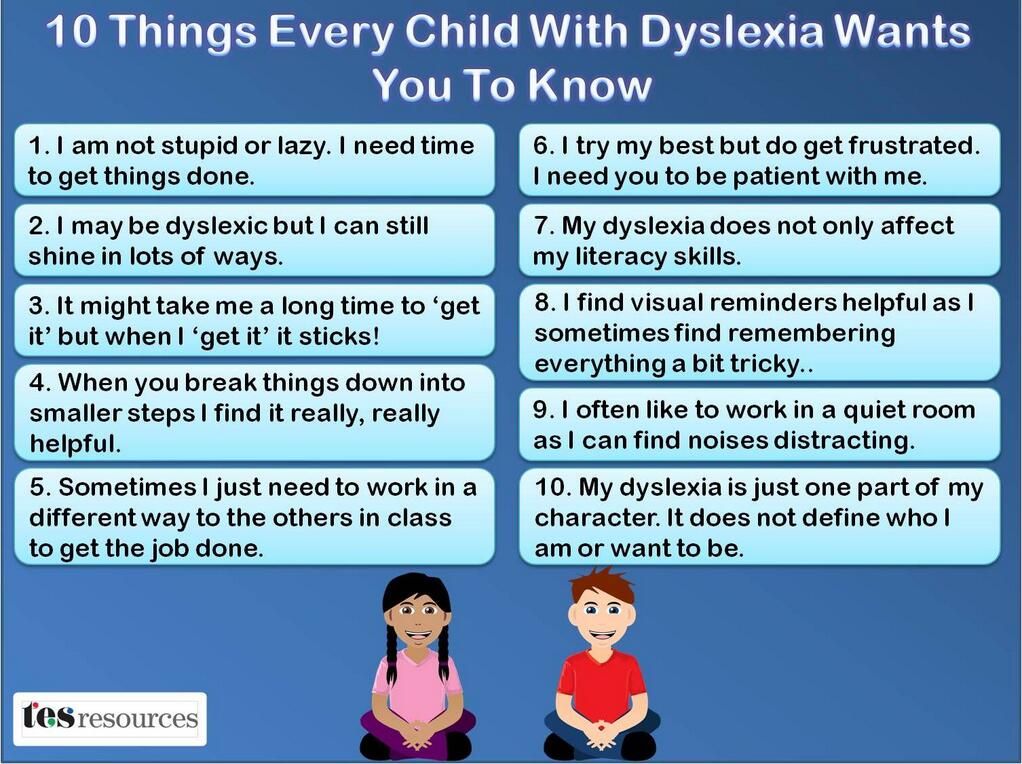
What to expect from your doctor
The health care provider is likely to ask you a number of questions, such as:
- When did you first notice that your child was having trouble reading? Did a teacher bring it to your attention?
- How is your child doing academically in the classroom?
- At what age did your child start talking?
- Have you tried any reading interventions? If so, which ones?
- Have you noticed any behavior problems or social difficulties you suspect may be linked to your child's trouble reading?
- Has your child had any vision problems?
Be ready to answer questions to make the most of your appointment time.
By Mayo Clinic Staff
How to identify dyslexia in a child, where to go and examples of famous dyslexics
If your child writes with mistakes, reads haltingly and faints at the thought of going to school, do not rush to hire tutors. Maybe he just has dyslexia.
Olga Stepanyan
“In the third grade, the teacher advised my parents to transfer me to a special school. She said I have retarded development syndrome, ”Maria Parfyonova informs me, as soon as we sit down at a table on the roof of the Bardeli bar, in which the daughter of journalist Leonid Parfyonov and culinary specialist Elena Chekalova successfully works as a manager. Parfyonova Jr. has been developing public relations without any delay in the trendy 15 Kitchen+Bar, and she is also trilingual and easily conducts secular discussions about history. But Maria is dyslexic. Like every tenth person in the world. nine0003
“Even today, few people know about dyslexia, and in my childhood, they didn't hear about it at all,” says Maria. “At school, they didn’t consider me a person: “Twenty-two mistakes in dictation! Well, what can we take from her?” Only one teacher ventured to suggest that Masha was not just lazy or lagging behind in development, and advised changing the public school to a private one.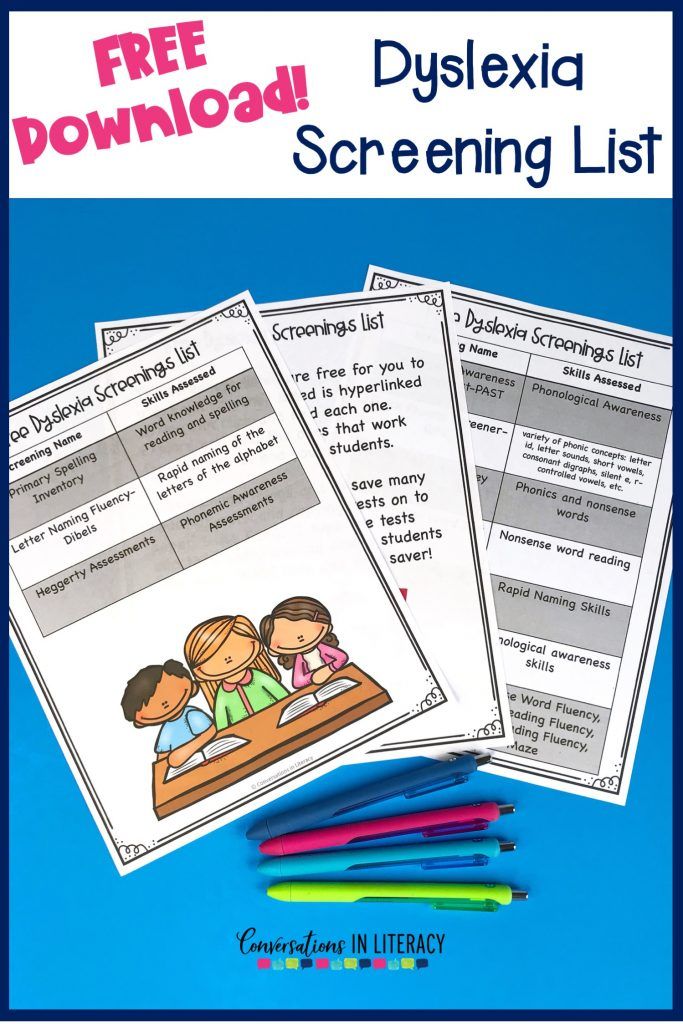 Her parents transferred her to the Golden Section. And then the girl was diagnosed with dyslexia. This is the name of the violation of the ability to master reading and writing while maintaining the ability to learn. nine0003
Her parents transferred her to the Golden Section. And then the girl was diagnosed with dyslexia. This is the name of the violation of the ability to master reading and writing while maintaining the ability to learn. nine0003
A dyslexic perceives text as images, in other words, sees pictures instead of words. Words that do not cause him visual associations, he simply skips when reading. Often, by the end of a sentence that other children can read with ease, the dyslexic is exhausted from nervous tension. It is almost impossible for him to retell what he read. Also, dyslexics do not see errors in the spelling of words and numbers. Often such a child swaps letters or numbers: for example, when solving a problem in arithmetic, he writes “5 +5 = 01” or draws “E” in writing in reverse. It is especially difficult for millennial children: in the era of social networks, Grammar Nazis lie in wait for dyslexics not only in Russian lessons, but also on Facebook. Maria Parfyonova, for example, stopped writing posts with adverbial phrases.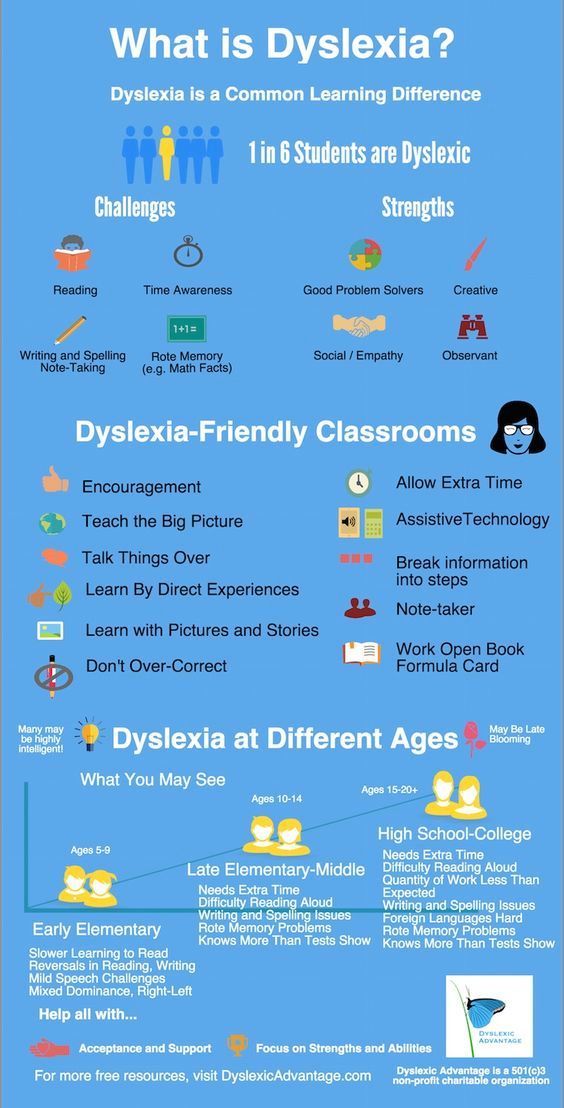 “I don’t know how to coordinate them,” she says. “And people comment: “Nature has rested on you!” Such oddities infuriate unprepared teachers and overly ambitious parents. “My acquaintances with dyslexia - now successful adults - told how their fathers in anger kicked out the doors of children's rooms, broke desks. They thought the child was just being lazy,” says Maria Piotrovskaya, founder of the Moscow Association of Parents and Children with Dyslexia. Naturally, they fell into a deep depression. Teachers are no better: trying to make the student catch up with the rest in terms of performance, they forced him to read aloud under a stopwatch. It's a huge stress for a child." nine0003
“I don’t know how to coordinate them,” she says. “And people comment: “Nature has rested on you!” Such oddities infuriate unprepared teachers and overly ambitious parents. “My acquaintances with dyslexia - now successful adults - told how their fathers in anger kicked out the doors of children's rooms, broke desks. They thought the child was just being lazy,” says Maria Piotrovskaya, founder of the Moscow Association of Parents and Children with Dyslexia. Naturally, they fell into a deep depression. Teachers are no better: trying to make the student catch up with the rest in terms of performance, they forced him to read aloud under a stopwatch. It's a huge stress for a child." nine0003
Maria Piotrovskaya herself, former head of the board of directors at Renaissance Credit Bank, left the world of finance and audit when her daughter was diagnosed with dyslexia. Maria tried to figure out what it was. It turned out to be easier to reduce the debit to the credit. In Russia, only speech therapists and neuropsychologists can tell about dyslexia with knowledge of the matter - narrow specialists, to whom they go in the direction.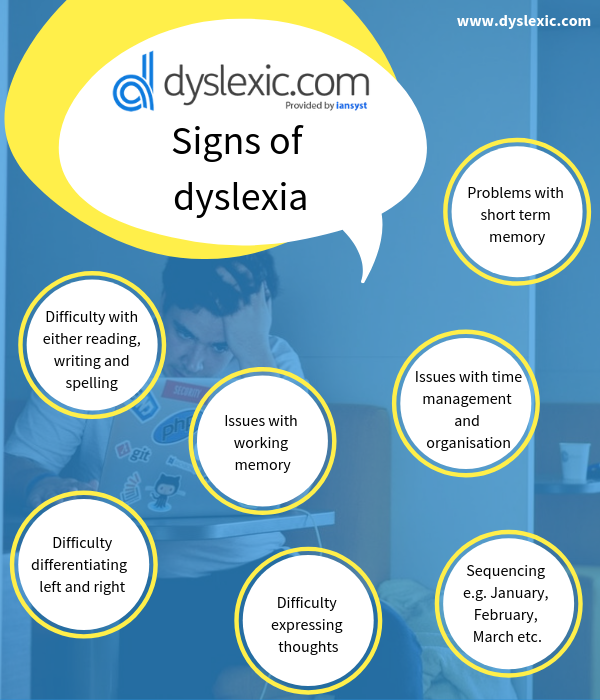 In the system of education and social support, dyslexia was also not heard; at the legislative level, the rights of dyslexics are not protected in any way. Maria opened her association in October with the support of Ruben Vardanyan and his charity project Philin. The initiative was supported by GITIS, since dyslexia is a common diagnosis in people of creative professions. And the State Hermitage, which is headed by Maria's father Mikhail Piotrovsky. Now the museum is preparing a program for schoolchildren, built not on memorizing texts, but on visual images. nine0003
In the system of education and social support, dyslexia was also not heard; at the legislative level, the rights of dyslexics are not protected in any way. Maria opened her association in October with the support of Ruben Vardanyan and his charity project Philin. The initiative was supported by GITIS, since dyslexia is a common diagnosis in people of creative professions. And the State Hermitage, which is headed by Maria's father Mikhail Piotrovsky. Now the museum is preparing a program for schoolchildren, built not on memorizing texts, but on visual images. nine0003
Every tenth person in the world suffers from dyslexia. But there are no official statistics and schools for such children in Russia.
“Our main task now is to explain to teachers and parents that if a child receives low grades, this does not mean that he is lazy or does not want to study,” says Maria. - The next task is to help change the legislative framework. To be sure that tests for dyslexia are carried out before entering elementary school and moving to middle school. We are also working to ensure that the school has teachers who are certified to work with such children in the lower grades - for starters. At least one per school. Diagnosis is usually made between the ages of five and nine (in England, diagnosis is made at age four). So the sooner teachers start working with such a child according to a special scheme, the more likely it is that he will graduate from school perfectly, he will be able to realize himself in any profession, avoiding psychological problems. nine0003
We are also working to ensure that the school has teachers who are certified to work with such children in the lower grades - for starters. At least one per school. Diagnosis is usually made between the ages of five and nine (in England, diagnosis is made at age four). So the sooner teachers start working with such a child according to a special scheme, the more likely it is that he will graduate from school perfectly, he will be able to realize himself in any profession, avoiding psychological problems. nine0003
“Dyslexia is considered to be inherited. But our experience shows that this is not necessary,” explains Inessa Khvostova, Managing Director of Lucullus Educational Consultants. - By the way, it is more difficult to identify dyslexia in girls than in boys: apparently, because they are more successful at hiding problems with their studies. That is why it was previously believed that the risk group was mostly boys.
To demand changes in Russian laws, we need statistics.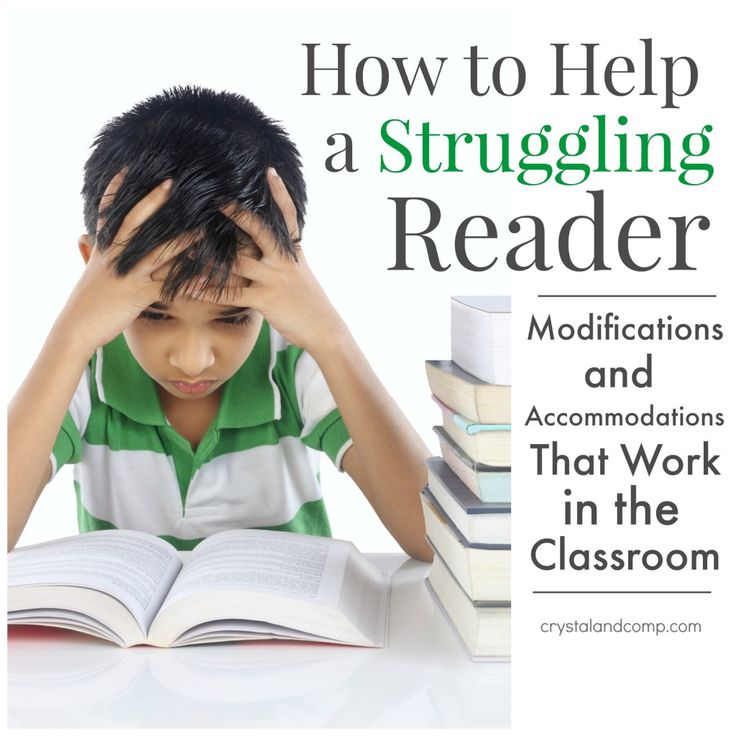 She, of course, is not. “We go to schools ourselves,” says Maria Piotrovskaya. - Not only in Moscow, but also, for example, in Chechnya and Ingushetia. In these regions, there are also many schoolchildren with dyslexia, in addition, education is bilingual, and this is an additional burden for children.” The association is developing teaching methods for children with different perceptions, which are going to be transferred to the Ministry of Education. The luminaries of science are working on it: psycholinguist Tatyana Chernigovskaya, neuropsychologist Tatyana Akhutina, vice-president of the Association of Speech Pathologists of St. Petersburg Alexander Kornev. And Piotrovskaya and her colleagues conducted free master classes called “Underachievement is curable” in five secondary schools in Moscow. The teachers came and honestly admitted that in every class there are underachieving students with characteristic features. nine0003
She, of course, is not. “We go to schools ourselves,” says Maria Piotrovskaya. - Not only in Moscow, but also, for example, in Chechnya and Ingushetia. In these regions, there are also many schoolchildren with dyslexia, in addition, education is bilingual, and this is an additional burden for children.” The association is developing teaching methods for children with different perceptions, which are going to be transferred to the Ministry of Education. The luminaries of science are working on it: psycholinguist Tatyana Chernigovskaya, neuropsychologist Tatyana Akhutina, vice-president of the Association of Speech Pathologists of St. Petersburg Alexander Kornev. And Piotrovskaya and her colleagues conducted free master classes called “Underachievement is curable” in five secondary schools in Moscow. The teachers came and honestly admitted that in every class there are underachieving students with characteristic features. nine0003
Parents come to the association's small office on Gogolevsky Boulevard.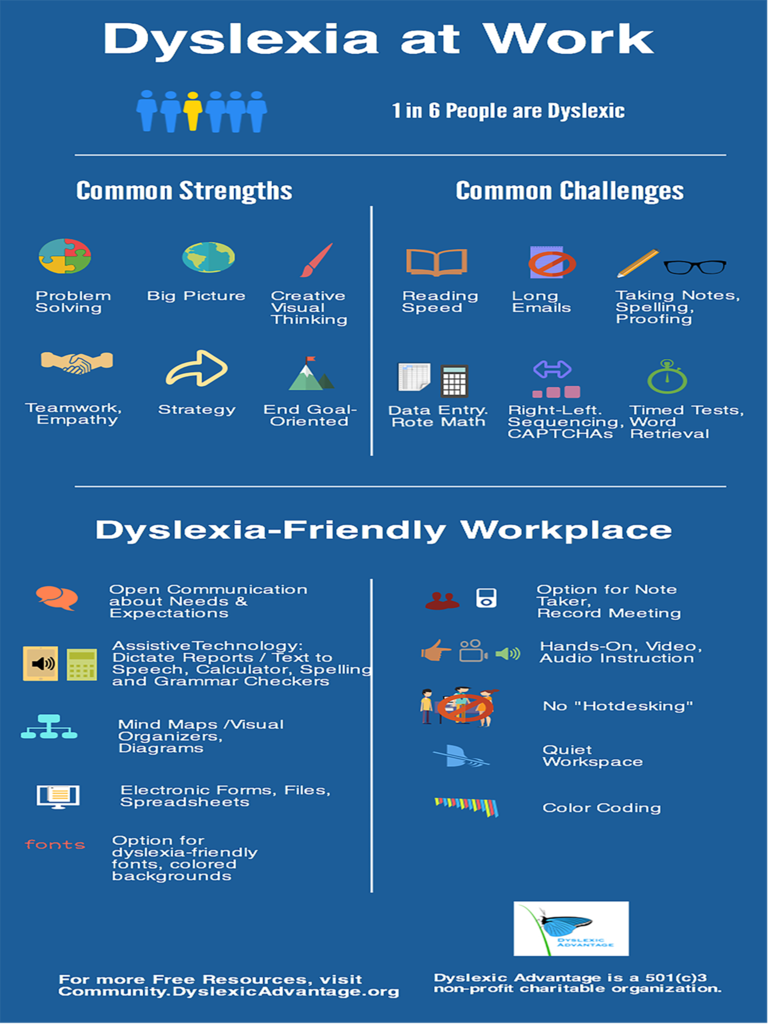 The center “Club Intellect 135” operates there, where a neurologist of the highest category, Gullzhan Sakbayeva, works with children. She still has few wards: most mothers, having learned about the diagnosis, pretend that everything is in order, they just need to hire tutors. Or they disown dyslexia as a deadly disease.
The center “Club Intellect 135” operates there, where a neurologist of the highest category, Gullzhan Sakbayeva, works with children. She still has few wards: most mothers, having learned about the diagnosis, pretend that everything is in order, they just need to hire tutors. Or they disown dyslexia as a deadly disease.
“I stopped posting gerunds on Facebook. And people comment: “Nature has rested on you!”
Alexandra Shishmareva, a student of the Faculty of History of Moscow State University, also has dyslexia. At the master classes of the association, Alexandra acts as a speaker. “As a child, I truly hated school,” she says now. - It got to the point that she began to get sick with everything that was possible, just not to go to class. The godmother sent me to St. Petersburg to the candidate of psychological sciences Elena Nikolaevna Chesnokova. For ten days, from morning until late at night, she worked with me according to the adapted American Orton-Gillingham system.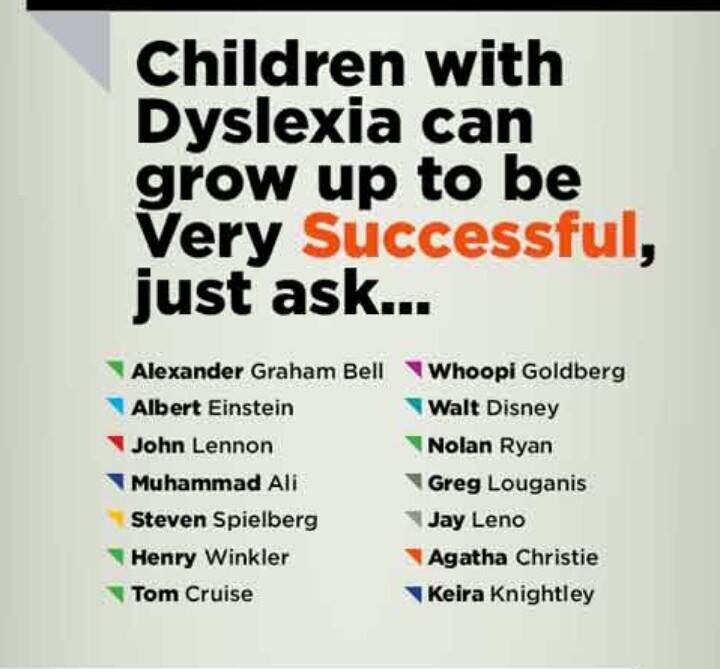 For example, we sculpted the letters of the alphabet from plasticine - first from A to Z, then from Z to A. When I returned to school, my literacy gradually improved. Last year, Shishmareva received high scores at the Unified State Examination in Russian and Literature and eventually entered the history department of Moscow State University without exams. nine0003
For example, we sculpted the letters of the alphabet from plasticine - first from A to Z, then from Z to A. When I returned to school, my literacy gradually improved. Last year, Shishmareva received high scores at the Unified State Examination in Russian and Literature and eventually entered the history department of Moscow State University without exams. nine0003
Despite the best efforts of volunteers and philanthropists, there are no schools in Russia that specialize in teaching dyslexics. Even in the advanced Golden Section, where they took on the daughter of Leonid Parfenov, there is no individual approach to such students, says Maria. “Nobody gives you extra time on tests,” she says. - Because then the parents will come and ask: "Why is Masha allowed more than my Vita?" Although in the "Golden Section" there were still many advantages compared to a regular school. For example, I studied Russian not with the class, but with a speech therapist, three times a week. With the teacher of the European Gymnasium, Maria Markovna Kazbek-Kazieva, Parfenova developed literacy: “She has her own methods for memorizing spelling rules.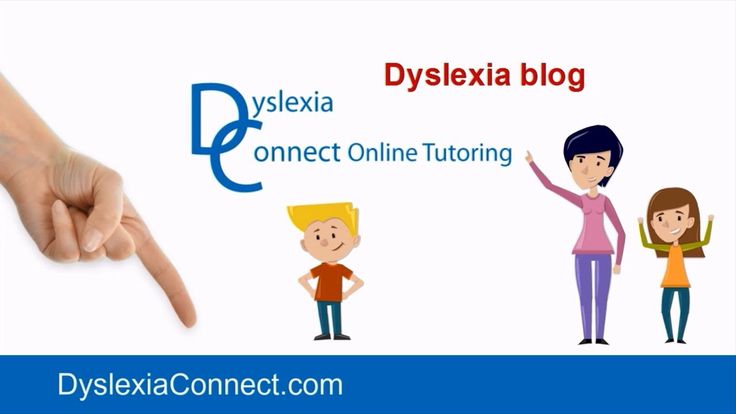 Maria Markovna pulled from a deuce to a four in a year. Two more years and I would start to write normally in Russian.” And the stories of Sergei Dovlatov helped the girl learn to read: “He writes the way people say. Also, reading his prose aloud, you can practice intonation - there are no long sentences, like, for example, Tolstoy's. nine0003
Maria Markovna pulled from a deuce to a four in a year. Two more years and I would start to write normally in Russian.” And the stories of Sergei Dovlatov helped the girl learn to read: “He writes the way people say. Also, reading his prose aloud, you can practice intonation - there are no long sentences, like, for example, Tolstoy's. nine0003
In the United States, dyslexia is considered a "special feature". This is the definition given by the National Institutes of Health and the International Development Association. Dyslexia is included in the Education with Disabilities Act, which is in force in thirty-seven states.
In the UK, dyslexia was introduced into the Chronically Ill and Incapacitated Persons Act in 1970. In 1987, the European Dyslexia Association was founded in Brussels, representing the interests of dyslexics in the European Parliament and UNESCO. “When I left to study in Europe, I was in shock,” recalls Maria Parfenova. - At the City University of London there is a disability center where they work with you.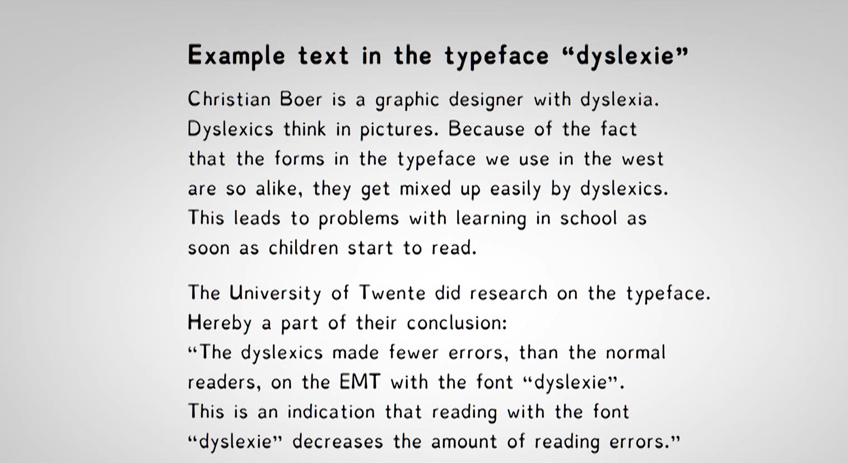 For the UK, this is an absolutely normal story. By the way, I must say thanks to the Golden Section school: in a letter of recommendation from there, they wrote to me that “due to the imperfection of the Russian education system, Maria’s grades are lower than they could be.” nine0003
For the UK, this is an absolutely normal story. By the way, I must say thanks to the Golden Section school: in a letter of recommendation from there, they wrote to me that “due to the imperfection of the Russian education system, Maria’s grades are lower than they could be.” nine0003
Secondary education in the UK is based on either the A Level system or the IB program. The latter is better adapted for teaching children with special needs and more suitable for dyslexics. In Moscow, for example, the European Gymnasium, the MES, the Anglo-American Gymnasium and the President School work according to the IB system. “In history lessons in an ordinary Russian school, events are told according to the textbook, concisely,” explains Maria Parfenova. - And in the IB system (I studied it at school in Italy), students are recommended to use visual materials as much as possible. For example, while studying the history of the Cold War, children watch a real American propaganda newsreel. Then a visual comparative analysis of events is made.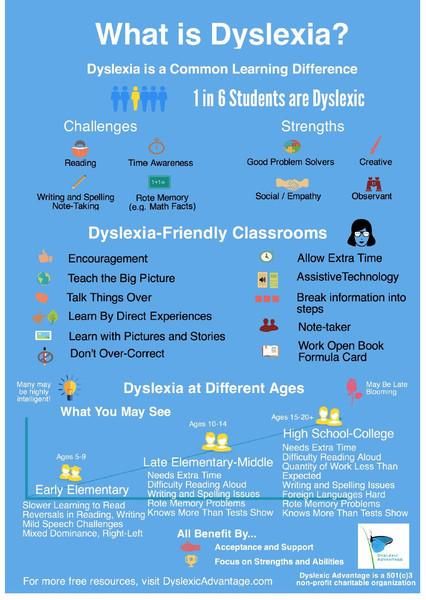 I can now draw this sign from memory. nine0003
I can now draw this sign from memory. nine0003
The sooner a child is diagnosed with dyslexia, the more likely it is that they will not have problems with learning and socialization in the future. “A child with dyslexia is extremely difficult to learn if the education system is built around reading, writing and remembering large amounts of information,” says Leslie Shaw-Wall, director of Foremarke Hall Repton Preparatory School in Derbyshire. “In Britain, various programs have been developed to educate such children.”
Angered dads knock down the doors of children's rooms, break desks. Teachers force the child to read under the stopwatch. nine0019
First, the degree of dyslexia is determined: minor (several characteristic features), mild, moderate, severe. Children with a severe form are usually sent to private schools that specialize in working with dyslexics. “But in fact, there is no need to apply to special schools,” says the director of Foremarke. “Most dyslexics study in regular schools – in the UK there are regulations that require an individual approach to the education of children with disabilities and special needs.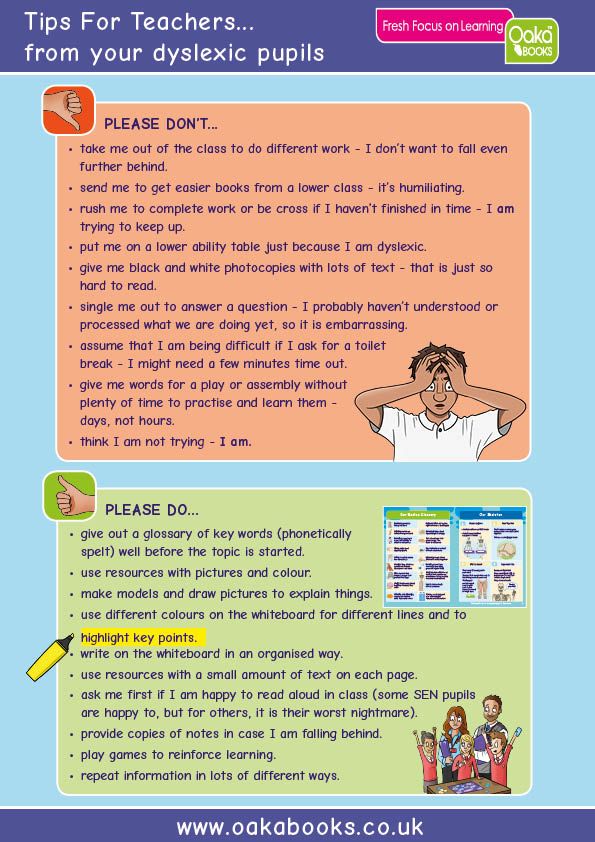 ” Dyslexics are given twenty percent more time on tests, and they take exams in a separate class. nine0003
” Dyslexics are given twenty percent more time on tests, and they take exams in a separate class. nine0003
It is important to know the main thing about dyslexia - it is not a disease, it cannot be cured. It is called "the gift that is always with you" - so poetically Ronald Davis, founder of the Center for the Study of Reading Problems in Burlingame, once called dyslexia. Often dyslexia is indeed a gift. Children who read and write with difficulty often have well-developed non-verbal thinking. They master many skills much faster than their peers and show creative abilities, such as an exceptional ear for music. They differ in sociability, often succeed in painting. nine0003
“According to Fernett and Brock Eide, authors of The Benefits of Dyslexia: Unlocking the Hidden Potential of the Dyslexic Brain, people who can’t focus on the little things tend to see the situation in a complex way, to imagine how processes will develop over time,” says the head of the London office of the educational agency Connexus Academic Advisors Vlad Konyashkin. Seeing relationships that elude others is another virtue of dyslexics. Pay attention to how your child draws conclusions. Dyslexics are distinguished by the ability to reason when the facts are not enough or they often change. Adding three-dimensional spatial perspectives is easier for dyslexics. In the future, they can work in the field of design, architecture, be engineers, builders, inventors, organic chemists.” nine0003
Seeing relationships that elude others is another virtue of dyslexics. Pay attention to how your child draws conclusions. Dyslexics are distinguished by the ability to reason when the facts are not enough or they often change. Adding three-dimensional spatial perspectives is easier for dyslexics. In the future, they can work in the field of design, architecture, be engineers, builders, inventors, organic chemists.” nine0003
But even if the child is still out of tune, playing the twenty-fourth capriccio of Paganini, it is definitely not necessary to give up and take him out of school. After all, Steve Jobs was also diagnosed with dyslexia. And mathematician Alan Turing, who deciphered the supercomplex German code during the war. And even the winner of the Nobel Prize in Literature, Winston Churchill.
8 signs your child may have dyslexia
“Most people think that dyslexia comes down to the inability to read and write,” explains Vlada Konyashkina, head of the London office of the educational agency Connexus Academic Advisors. - It's a delusion. These children face other challenges as well.” nine0003
- It's a delusion. These children face other challenges as well.” nine0003
A dyslexic differs from a child with low IQ in that:
1. He lacks organizational skills.
2. He has trouble doing things sequentially (for example, a child has trouble doing a math problem because they confuse the order of steps in a solution).
3. There are difficulties with the perception of time.
4. The child is constantly distracted.
5. He often has mood swings.
6. When reading, it seems to him that the letters are moving, and he confuses their sequence. nine0003
7. There are problems with the speed of information processing and memorization.
8. It is difficult for a child to build complex sentences with a complete thought.
Dyslexics remember information better if it is presented in the form of concrete examples or stories from life, rather than abstract reasoning. For example, your child is likely to remember perfectly well who and what gave his sister for her birthday two years ago, but not his class schedule.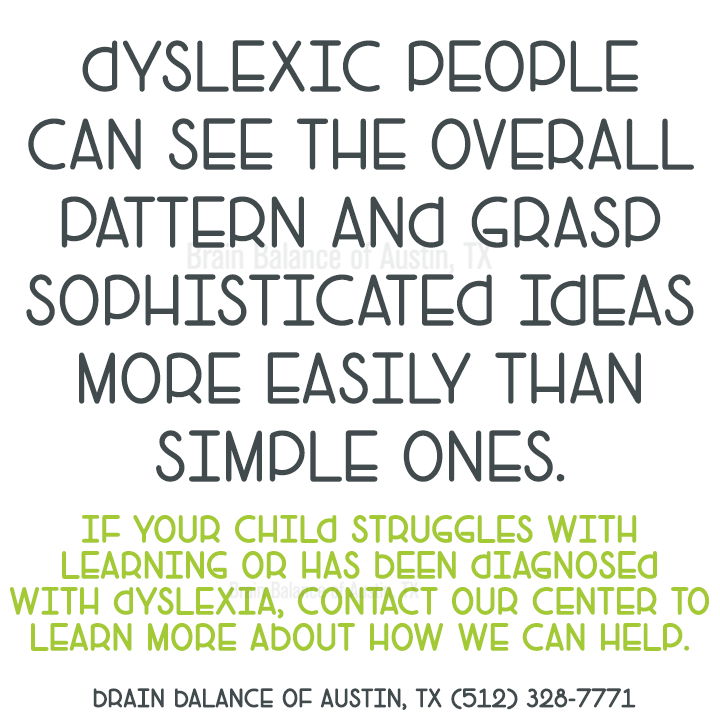
Where to run
How dyslexia is diagnosed and where special children are taught, says Inessa Khvostova, Managing Director of Lucullus Educational Consultants. To diagnose or rule out dyslexia, a child is asked to listen, read, and remember sequences of words, numbers, or colors. Thus, short-term and long-term memory, the ability to analyze information, the level of attention and concentration are checked. They will also offer tests for logic, for reading comprehension, for verbal and non-verbal thinking, as well as tests for intelligence. nine0003
However, dyslexia does not imply a lack of intelligence and does not put an end to education and career. For example, my dyslexic husband is an architect. He can only draw if he listens to an audiobook. And I, for example, can’t listen to audiobooks at all: attention is scattered.
No two dyslexics are the same. Dyslexia manifests itself differently for each person: one with dyspraxia, the other with attention deficit disorder.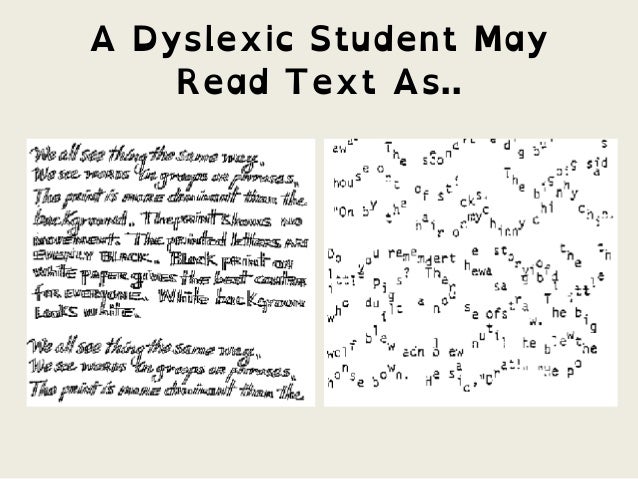
Recommendations are based on test results in each individual case. The school is chosen the same way. For example, the More House school in Surrey, England is suitable for children with a complex form of dyslexia: there they study a maximum of five subjects instead of the generally accepted twelve, and besides, teachers teach them overtime. nine0003
Seaford School in Sussex and Bryanston School in Dorset work well with medium uniforms. Almost thirty percent of the students in these schools are dyslexic.
Even Eton and Winchester Colleges will accept students with a mild form of dyslexia (there are eight percent of such special students). Children are engaged with the teacher individually or in mini-groups.
Famous dyslexics
You don't have to have an A in penmanship to go down in history. nine0096
Richard Branson
Founder of the Virgin Group and top business role model in the 2000s, he left school at sixteen but wrote nine motivational books.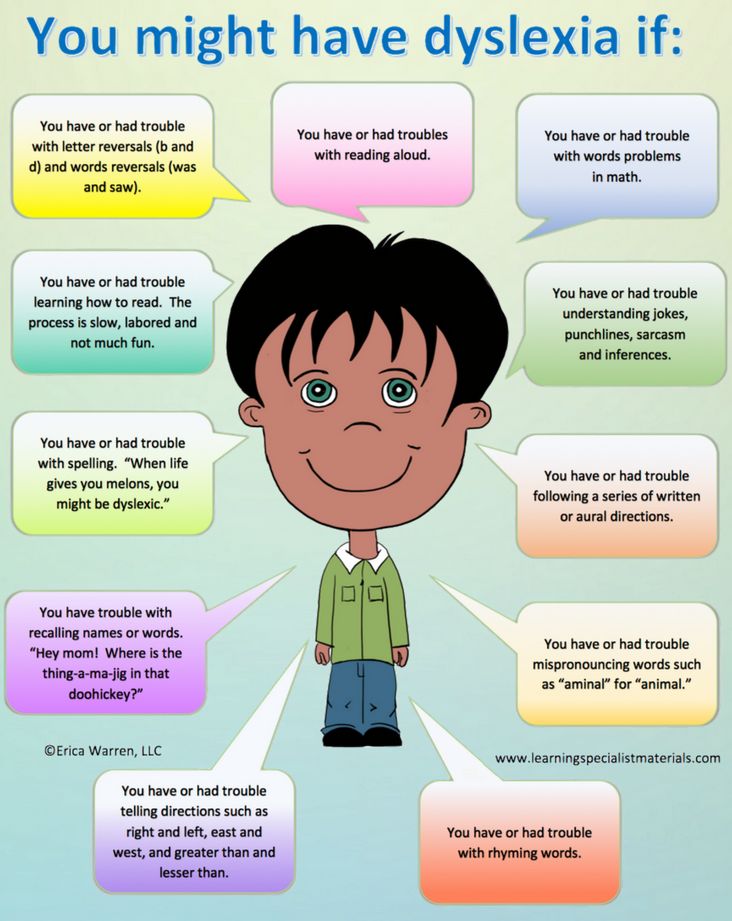 Everywhere there is at least a line about dyslexia. Knowing his peculiarity, Sir Richard surrounded himself with professionals who excelled him in academic excellence, and delegated most of his authority to them. And he began to come up with new projects. Branson has neither a certificate nor a diploma so far. But there is a fortune of almost five billion dollars. nine0003
Everywhere there is at least a line about dyslexia. Knowing his peculiarity, Sir Richard surrounded himself with professionals who excelled him in academic excellence, and delegated most of his authority to them. And he began to come up with new projects. Branson has neither a certificate nor a diploma so far. But there is a fortune of almost five billion dollars. nine0003
Michael Phelps
The number one swimmer has the record number of Olympic medals. And in the children's medical record - attention deficit hyperactivity disorder and dyspraxia (disorder of the motor apparatus, in which there are problems with coordination).
Steve Jobs
Dropped out of school several times and only lasted one semester in college. I never really learned how to write and read. And, probably, that is why he gave humanity a phone that can independently select words in messages. nine0003
John Lennon
Stupefied teachers by not being able to spell a single word, confusing consonant words and writing by swapping letters. Now these texts are sung all over the world.
Now these texts are sung all over the world.
Vladimir Mayakovsky
An irony of fate: the poet, whose poetry is torture for dyslexics, himself suffered from a text perception disorder. Hence the stanzas "ladder", and ignoring punctuation marks. Reading to Vladimir Vladimirovich was not given: Lilya Brik collected materials for his poems. nine0003
Photo: anne menke/trunk archive/photosenso, rex features/fotodom; AP, Zuma, ABACA Press/TASS
Tigigeroiroitatler Teenshkolami Best School of the World 2017 Educational School of the World
How to recognize dyslexia in a child: 15 signs
Educational Head
Difficulties in Teachers, and with classmates
- mike mols/Shutterstock/Fotodom.ru
“Yes, he’s just lazy”, “He doesn’t try”, “He doesn’t want to study, even if you crack”, “I fight with him, I fight, everything is like a pea wall” - similar complaints from parents (and teachers too) for children - full.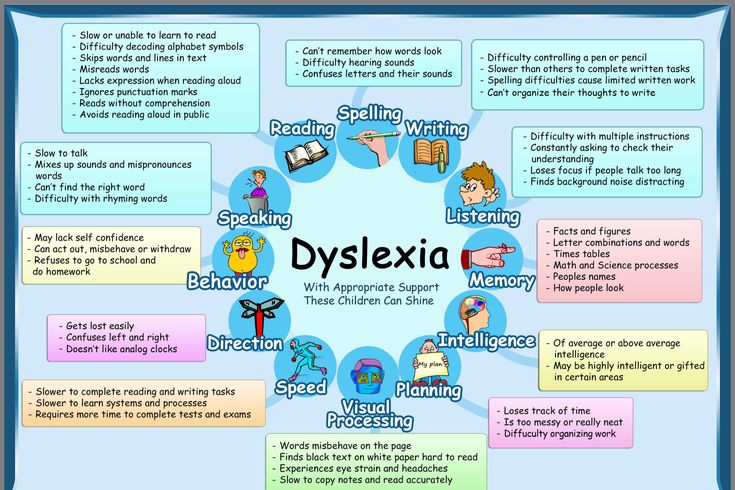 Few people think that it may not be laziness at all. It often happens that it is objectively difficult for a child to perceive and assimilate information. He is absolutely not to blame for this, but he is punished for it. nine0003
Few people think that it may not be laziness at all. It often happens that it is objectively difficult for a child to perceive and assimilate information. He is absolutely not to blame for this, but he is punished for it. nine0003
Dyslexia, as well as dysgraphia, dyscalculia are features of information perception that make it difficult for children to learn to read, write, and do mathematics. According to foreign studies, dyslexia manifests itself in every tenth schoolchild. The Ministry of Education indicates that about 64% of children come to the 1st grade with speech disorders, every fifth child faces learning difficulties, of which about 80% are in reading.
What is the cause
It is important to understand that dyslexia is not a disease, it is a neurobiological feature. The intelligence of a child with dyslexia is not impaired, and his problem is not at all an unwillingness to learn or laziness. nine0003
There is no unequivocal definition of the causes of dyslexia yet.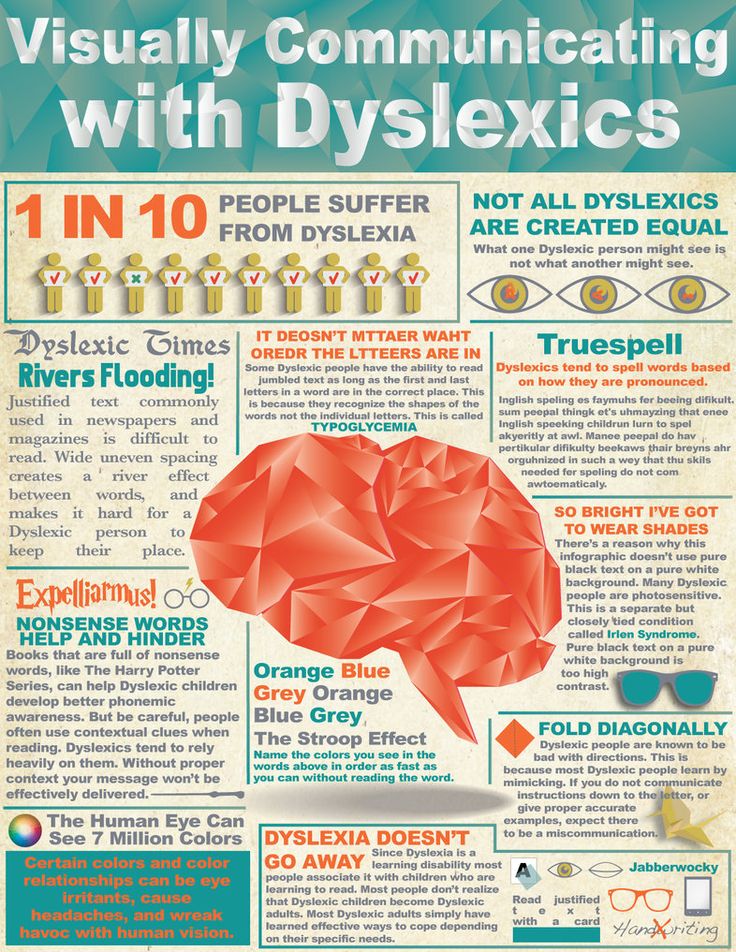 But medical and psychological research has found differences in the development of certain mental functions and abilities in children with dyslexia. Most of them have difficulty recognizing individual sounds in a word and/or understanding how letters represent sounds. But such children can be creative individuals, think outside the box.
But medical and psychological research has found differences in the development of certain mental functions and abilities in children with dyslexia. Most of them have difficulty recognizing individual sounds in a word and/or understanding how letters represent sounds. But such children can be creative individuals, think outside the box.
Main signs
Usually, difficulties in developing writing, reading, mastering counting operations clearly begin to manifest themselves at school. But some signs can be paid attention even earlier, at preschool age. nine0003
Speech problems:
-
Speech is developing more slowly than peers
-
Pronunciation defects are preserved after 5-6 years
-
Learning of poems is a serious difficulty of
-
Children, days or days or days or days or days or days old or days or days. time of day
-
Makes a lot of mistakes in reading and writing, reads slowly and does not understand what he read
Visuo-spatial difficulties:
-
Child has poor right-left orientation,
-
Can ignore left-hand signs, letters, and even a page mirror, confuses similar letters
-
Dislikes games that require spatial thinking
Motor and regulatory difficulties:
-
Shows clumsiness and poor coordination in outdoor games
-
Has problems with the development of fine motor skills (cannot tie shoelaces, use scissors, jigsaw puzzles)
-
Holds a spoon or pencil incorrectly
-
Does everything very slowly or, on the contrary, is impulsive, hyperactive
Trust your child
First of all, difficulties with the perception of information affect academic performance, and from the very beginning of education. Often this entails problems in communicating with classmates, he stands out from the team, and teachers do not always treat him with understanding, do not delve into a difficult situation. nine0003
Often this entails problems in communicating with classmates, he stands out from the team, and teachers do not always treat him with understanding, do not delve into a difficult situation. nine0003
Why are there more and more children with speech impediments? Together with a specialist, we answer the question in this material.
A kid is often scolded for his condition, which he cannot control. First of all - to a speech therapist or psychologist, neuropsychologist. And to get guaranteed free help, you should follow the recommendations of the PMPK (Psychological-Medical-Pedagogical Commission). nine0003
But today in Russia not all teachers know the problem, and many parents simply turn a blind eye to school difficulties, simply do not believe their child and do not understand that he needs help. Parents scold children for poor academic performance, absenteeism begins, and further along the chain, the development of deviations is possible.
Read also: “Second-grader son doesn’t want to do homework — screams and quarrels”
Additional difficulties and attention.
 Such children require a special approach to learning, and you also need to be prepared for this. It will require adaptation of the program, classes with a school speech therapist and psychologist. The child will receive this assistance free of charge. nine0003
Such children require a special approach to learning, and you also need to be prepared for this. It will require adaptation of the program, classes with a school speech therapist and psychologist. The child will receive this assistance free of charge. nine0003 It is possible to take a course of correction in a specialized center that offers classes with a speech therapist or psychologist, in rare cases it may be advisable to switch to individual home training.
If a child gets tired quickly, is capricious, or fails to complete some task, it is worth listening and finding the reason for such behavior. For example, children with dyslexia perceive audio books much better and remember information faster in this way. And traditional printed and electronic texts cause them great difficulties. nine0003
Children with dyslexia can think in images, so do not scold the child if, for example, when preparing homework, he draws or makes something - probably, in this way he simply understands and remembers the material better. Use more visuals in teaching - watch documentaries when studying history, use multi-colored pens and pencils when writing.
Use more visuals in teaching - watch documentaries when studying history, use multi-colored pens and pencils when writing.
It must be remembered that dyslexic children often have other talents. The task of a parent is to feel his child and give him enough attention to understand and help develop his strengths. nine0003
If you understand in time that you are dealing with dyslexia and develop an individual training program, your child has every chance to master writing and reading, become a literate person, and successfully realize himself professionally.
See also: "Dyslexia and talent: stars who struggled to read"
Dyslexic kids think differently. We have yet to learn how to deal with it
- Photo
- Shutterstock/Fotodom.ru
Useful links
An initial consultation with a speech therapist or psychologist can be obtained at a polyclinic, school or city psychological and pedagogical center.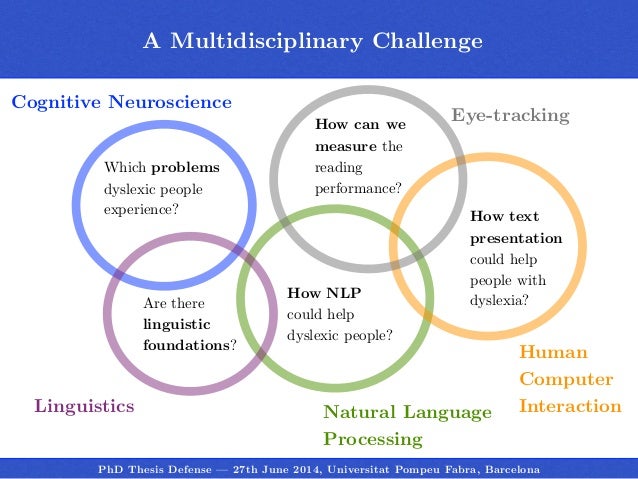 To receive free psychological and pedagogical support, preferential conditions for training, you need to go through a psychological, medical and pedagogical commission (PMPC).
To receive free psychological and pedagogical support, preferential conditions for training, you need to go through a psychological, medical and pedagogical commission (PMPC).
-
The website of the PMPK Federal Resource Center contains all important information, as well as a navigator for Russian cities with contact details of all PMPKs in the country (websites, contact details, full name of the head) by federal districts. nine0003
-
After passing the PMPK, a child can get help from a speech therapist and a psychologist at a school or a city psychological and pedagogical center. Navigator of such centers in Russia on the website of the Federal Resource Center for the Development of a System of Comprehensive Support for Children with Disabilities and Disabilities.
-
Families are supported by the Association of Parents and Children with Dyslexia. The website of the Association provides comprehensive information about dyslexia, as well as about modern Russian and foreign studies of the problem.
